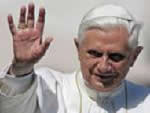|
Pope Benedict XVI- Angelus |
 Angelus
Message
Angelus
Message
On Wealth and Poverty
"Equal Distribution of Goods Is a Priority"
H.H. Benedict XVI
September 23, 2007
www.zenit.org
Dear brothers and sisters!
This morning I visited the Diocese of Velletri of which I was the
titular cardinal for several years. It was a familial encounter,
which permitted me to relive past moments rich with spiritual and
pastoral experiences. During the solemn Eucharistic celebration, in
speaking about the liturgical texts, I was able to reflect on the
correct use of earthly goods, a theme that St. Luke the evangelist,
in various ways, has brought to our attention over the last few
Sundays.
In the parable of the dishonest, yet sharp steward, Christ teaches
his disciples the best way to use money and material riches; share
them with the poor and in this way earn their friendship, in view of
the Kingdom of heaven. "Make friends for yourselves by means of
unrighteous mammon," says Jesus, "so that when it fails they may
receive your into the eternal habitations" (Luke 16:9).
Money is not "dishonest" in itself, but more than anything else it
can close man up within a blind egoism. What is needed therefore is
a sort of "conversion" of economic goods: Instead of using them for
one's own interests, we need to also think of the necessities of the
poor, imitating Christ himself, who, wrote St. Paul, "Though he was
rich, yet for your sake he became poor, so that by his poverty you
might become rich" (2 Corinthians 8:9). It seems to be a paradox:
Christ did not enrich us with his wealth, but with his poverty, that
is with his love that motivated him to give himself completely to
us.
This could open up a vast and complex field of reflection on the
theme of wealth and poverty, even on the world stage, in which two
rationales regarding economics come face to face: the logic of
profit and that of the equal distribution of goods, and one does not
contradict the other, provided that their relationship is
well-ordered. Catholic social doctrine has always sustained that the
equal distribution of goods is a priority. Profit is naturally
legitimate and, in a just measure, necessary for economic
development.
John Paul II wrote in "Centesimus Annus": "The modern business
economy has positive aspects. Its basis is human freedom exercised
in the economic field, just as it is exercised in many other fields
(No. 32). However, he adds, capitalism is not considered the only
valid model of economic organization (No. 35). The crises of hunger
and the environment are denouncing, with growing evidence, that the
logic of profit, if it prevails, increases the disproportion between
rich and poor and a harmful exploitation of the planet. When the
logic of sharing and solidarity prevails on the other hand, it is
possible to correct the course of action and orient it toward
proportional and sustainable development.
Mary Most Holy, who in the Magnificat proclaims: the Lord "has fed
the hungry with good things, and the rich he has sent away empty"
(Luke 1:53), help all Christians to use with evangelical wisdom,
that is, with generous solidarity, earthly goods, and inspire
governments and economists with farsighted strategies that favor the
authentic progress of all peoples.
[Translation by ZENIT]
© Copyright 2007 -- Libreria Editrice Vaticana
This page is the work of the Servants of the Pierced Hearts of Jesus and
Mary